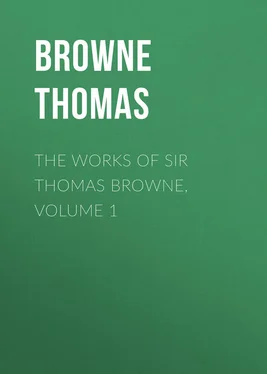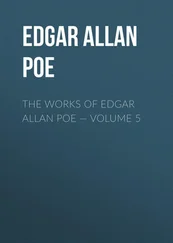Thomas Browne - The Works of Sir Thomas Browne, Volume 1
Здесь есть возможность читать онлайн «Thomas Browne - The Works of Sir Thomas Browne, Volume 1» — ознакомительный отрывок электронной книги совершенно бесплатно, а после прочтения отрывка купить полную версию. В некоторых случаях можно слушать аудио, скачать через торрент в формате fb2 и присутствует краткое содержание. ISBN: , Жанр: foreign_antique, foreign_prose, на английском языке. Описание произведения, (предисловие) а так же отзывы посетителей доступны на портале библиотеки ЛибКат.
- Название:The Works of Sir Thomas Browne, Volume 1
- Автор:
- Жанр:
- Год:неизвестен
- ISBN:http://www.gutenberg.org/ebooks/39960
- Рейтинг книги:5 / 5. Голосов: 1
-
Избранное:Добавить в избранное
- Отзывы:
-
Ваша оценка:
- 100
- 1
- 2
- 3
- 4
- 5
The Works of Sir Thomas Browne, Volume 1: краткое содержание, описание и аннотация
Предлагаем к чтению аннотацию, описание, краткое содержание или предисловие (зависит от того, что написал сам автор книги «The Works of Sir Thomas Browne, Volume 1»). Если вы не нашли необходимую информацию о книге — напишите в комментариях, мы постараемся отыскать её.
The Works of Sir Thomas Browne, Volume 1 — читать онлайн ознакомительный отрывок
Ниже представлен текст книги, разбитый по страницам. Система сохранения места последней прочитанной страницы, позволяет с удобством читать онлайн бесплатно книгу «The Works of Sir Thomas Browne, Volume 1», без необходимости каждый раз заново искать на чём Вы остановились. Поставьте закладку, и сможете в любой момент перейти на страницу, на которой закончили чтение.
Интервал:
Закладка:
Sect. 6. Pag. 95.
I cannot believe the story of the Italian, etc. ] It is reported that a certain Italian having met with one that had highly provoked him, put a Ponyard to his breast, and unless he would blaspheme God, told him he would kill him, which the other doing to save his life, the Italian presently kill'd him, to the intent he might be damned, having no time of Repentance.
Sect. 7. Pag. 97.
I have no sins that want a Name. ] The Author in cap. ult. lib. ult. Pseudodox. speaking of the Act of carnality exercised by the Egyptian Pollinctors with the dead carcasses, saith we want a name for this, wherein neither Petronius nor Martial can relieve us; therefore I conceive the Author here means a venereal sin.
This was the Temper of that Leacher that carnal'd with a Statua. ] The Latine Annotator upon this hath these words: Romæ refertur de Hispano quodam . But certainly the Author means the Statue of Venus Gnidia made by Praxiteles , of which a certain young man became so enamoured, that Pliny relates, Ferunt amore captum cum delituisset nocta simulachro cohæsisse, ejusq; cupiditas esse indicem masculum . Lucian also has the story in his Dialog . [ Amores. ]
And the constitution of Nero in his Spintrian recreations. ] The Author doth not mean the last Nero , but Tiberius the Emperour, whose name was Nero too; of whom Sueton. Secessu vero Capreensi etiam sellariam excogitavit sedem arcanarum libidinum, in quam undique conquisti puellarum et exoletorum greges monstrosiq; concubitus repertores, quos spintrias apellabat, triplici serie connexi invicem incestarent se coram ipso, ut adspectu deficientes libidines excitaret. Suet. in Tib. 43 .
Sect. 8 Pag. 98.
I have seen a Grammarian toure and plume himself over a single line in Horace, and shew more pride, etc. ] Movent mihi stomachum Grammatistæ quidam, qui cum duas tenuerint vocabularum origenes ita se ostentant, ita venditant, ita circumferunt jactabundi, ut præ ipsis pro nihilo habendos Philosophos arbitrentur. Picus Mirand. in Ep. ad Hermol. Barb. quæ extat lib. nono Epist. Politian .
Garsio quisq; duas postquam scit jungere partes,
Sic stat, sic loquitur, velut omnes noverit artes.
Pag. 99.
I cannot think that Homer pin'd away upon the Riddle of the Fishermen. ] The History out of Plutarch is thus: Sailing from Thebes to the Island Ion , being landed and set down upon the shore, there happen'd certain Fishermen to pass by him, and he asking them what they had taken, they made him this Enigmatical answer, That what they had taken, they had left behind them; and what they had not taken, they had with them: meaning, that because they could take no Fish, they went to loose themselves; and that all which they had taken, they had killed, and left behind them, and all which they had not taken, they had with them in their clothes: and that Homer being struck with a deep sadness because he could not interpret this, pin'd away, and at last dyed. Pliny alludes to this Riddle, in his Ep. to his Friend Fuscus , where giving an account of spending his time in the Country, he tells him, Venor aliquando, sed non sine pugilluribus, ut quamvis nihil ceperim, non nihil referam. Plin. Ep. lib. 9, Ep. 36 .
Or that Aristot. – did ever drown himself upon the flux or reflux of Euripus. ] Laertius reports that Aristotle dyed of a disease at 63 years of age. For this and the last, see the Author in Pseudodox .
Aristotle doth but instruct us as Plato did him, to confute himself. ] In the matter of Idea's , Eternity of the world, etc.
Sec. 9. Pag. 100.
I could be content that we might procreate like trees without conjunction, or that there were any way to perpetuate the world without this trivial and vulgar way of Coition: It is the foolishest act a wise man commits in all his life. ] There was a Physitian long before the Author, that was of the same opinion, Hippocrates ; for which vide A. Gel. l. 19. Noct. Attic. c. 2 . And so of late time was Paracelsus , who did undertake to prescribe a way for the generation of a man without coition. Vide Campanel. de sensu rerum, in Append. ad cap. 19. l. 4. Monsieur Montaignes words on this subject, are worth the reading; these they are: Je trouve apres tout, que l'amour n'est autre chose que la fame de cette jouyssance, et considerant maintes fois la ridicule titillation de ce plaiser par on il nous tient, les absurdes movements escervelez et estourdis dequoy il agite Zenon et Cratippus, ceste rage indiscrete, ce visage inflamme de fureur et de cruaute au plus doux effect de l'amour, et puis cette morgue grare severe et extatique en une action si folle, et que la supreme volupte aye du trainsy et du plaintiff commer la douleur, je croye qu'on se joue de nous, et que c'est par industrie que nature nous a laisse la plus trouble de nos actions les plus communes pour nous esgaller par la et apparier les fols et les sayes, et nous et les bestes. Le plus contemplatif et prudent homme quand je l'imagin en cette assiette je le tien pour un affronteur, de faire le prudent et le contemplatif: et sont les pieds du paon qui abbatent son orgueil. Nous mangeons bien et beuvons comme les bestes, mais ce ne sont pas actions, qui empeschent les operations de nostre ame, en celles-la nous gardons nostre advantage sur elles: cettecy met tout autre pensee sous le joug, abrutist et abesiit par son imperieuse authorite toute la Theology et Philosophy, qui est en Platon et si il ne s'en plaint pas. Par tout ailleurs vous pouvez garder quelque decence; toutes autres operations souffrent des Regles d'honestete: cettecy ne se peut sculement imaginer que vitieuse ou ridicule; trouvez y pour voir un proceder sage et discret. Alexander disoit qu'il se cognossoit principalement mortel par cette action et par le dormir: le sommeil suffoque et supprime les facultez de nostre ame, la besoigne les absorbe et dissipe de mesme. Certes c'est une marque non seulement de nostre corruption originelle, mais aussi de nostre vanite et disformite. D'un coste nature nous y pousse ayant attaché à ce desire la plan noble, utile et plaisante de toutes ses operations, et la nous laisse d'autre part accuser et fuyr comme insolent et dishoneste, en rougir et recommander l'abstinence , etc. Montaign liv. 3. chapit. 5 .
Sect. 10. Pag. 103.
And may be inverted on the worst. ] That is, that there are none so abandoned to vice, but they have some sprinklings of vertue. There are scarce any so vitious, but commend virtue in those that are endued with it, and do some things laudable themselves, as Plin. saith in Panegyric . Machiavel upon Livy, lib. 1. cap. 27 . sets down the ensuing relation as a notable confirmation of this truth. Julius Pontifex ejus nominis secundus, anno salutis 1505. Bononiam exercitus duxit, ut Bentivolorum familiam, quæ ejus urbis imperium centum jam annos tenuerat, loco moveret. Eudemque in expeditione etiam Johannem Pagolum, Bagloneum tyrannum Perusinum sua sede expellere decreverat, ut cæteros item, qui urbes Ecclesiæ per vim tenerent. Ejus rei causa cum ad Perusinam urbem accessisset, et notum jam omnibus esset quid in animo haberet: tamen impatiens moræ, noluit exercitus expectare, sed inermis quasi urbem ingressus est, in quant Johannes Pagolus defendendi sui causa, non exiguas copias contraxerat. Is autem eodem furore, quo res suas administrare solebat, una cum milite, cui custodiam sui corporis demandarat, sese in pontificis potestatem dedidit; à quo abductus est relictusque alius, qui Ecclesiæ nomine urbem gubernaret. Hac ipsu in re magnopere admirati sunt viri sapientes, qui Pontificem comitabantur, cum Pontificis ipsius temeritatem, cum abjectum vilemq; Johannis Pagoli animum: nec causam intelligebant, ob quam permotus idem Pagolus, hostem suum inermem (quod illi cum perpetua nominis sui memoria facere licebat) non subitò oppresserit, et tam pretiosa spolia diripuerit; cum Pontifex urbem ingressus fuisset, Cardinalibus tantum suis stipatus, qui pretiosissimas quasq; suarum rerum secum habebant. Neque enim credebatur Pagolus a tanto facinore vel sua bonitate, vel animi conscientia abstinuisse: quod in hominem sceleratum, qui et propria sorore utebatur, et consobrinos nepotesque dominandi causa e medio sustulerat hujusmodi pii affectus cadere non viderentur. Cum igitur hac de re variæ essent sapientum virorum sententiæ; concluserunt tandem id ei accidisse, quod ita comparatum sit , ut homines neque plane pravi esse queant, neque perfecte boni. Pravi perfecte esse nequeant, propterea quod, ubi tale quoddam scelus est, in quo aliquid magnifici ac generosi insit, id patrare non andeant. Nam cum Pagolus neq; incestam prius horraisset, neque patricidio abstinnisset: tamen cnm oblata esset occasio, pravi quidem sed memorabilis, atque æternæ memoriæ facinoris patrandi, id attentare non ausus fuit, cum id sine infamia prestare licuisset, quod rei magnitudo omnia priora scelera obtegere potuisset, et a periculo conservare. Quibus accedit, quod illi gratulati fuissent etiam quam plurimi, si primus ausus esset Pontificibus monstrare rationem dominandi; totiusque humanæ vitæ usum ab illis nimis parei pendi.
Читать дальшеИнтервал:
Закладка:
Похожие книги на «The Works of Sir Thomas Browne, Volume 1»
Представляем Вашему вниманию похожие книги на «The Works of Sir Thomas Browne, Volume 1» списком для выбора. Мы отобрали схожую по названию и смыслу литературу в надежде предоставить читателям больше вариантов отыскать новые, интересные, ещё непрочитанные произведения.
Обсуждение, отзывы о книге «The Works of Sir Thomas Browne, Volume 1» и просто собственные мнения читателей. Оставьте ваши комментарии, напишите, что Вы думаете о произведении, его смысле или главных героях. Укажите что конкретно понравилось, а что нет, и почему Вы так считаете.












